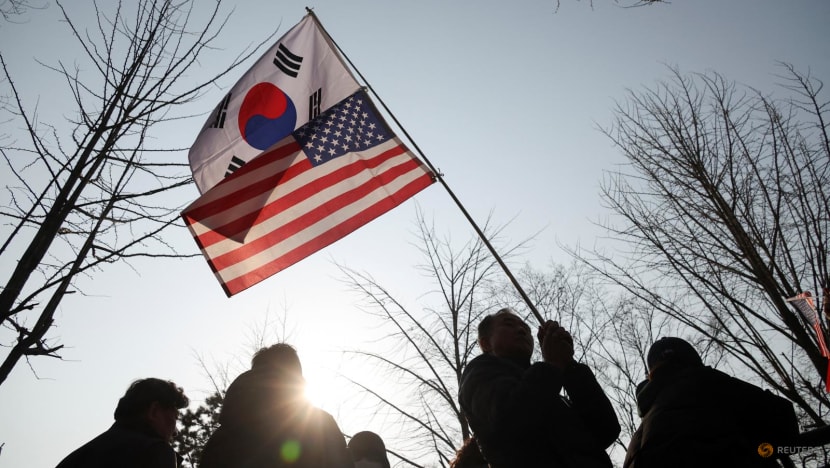Trump says US will impose 15% tariff on South Korean imports
"We have crossed a big hurdle," South Korean President Lee Jae-myung said in a post on Facebook.

A person holds a South Korean flag and a US flag in Uiwang, South Korea on Mar 8, 2025. (File photo: Reuters/Kim Hong-ji)
WASHINGTON: United States President Donald Trump said on Wednesday (Jul 30) the US will charge a 15 per cent tariff on imports from South Korea as part of a deal that eases, for now, tension with a top-10 trading partner and key Asian ally.
The arrangement, announced shortly after Trump met with Korean officials at the White House, came during a blizzard of trade policy announcements ahead of a self-imposed Aug 1 deadline.
That is when Trump promised that higher tariffs would kick in on US imports from a range of countries. Imports from South Korea, a powerhouse exporter of computer chips, cars and steel, faced a 25 per cent rate.
"I am pleased to announce that the United States of America has agreed to a Full and Complete Trade Deal with the Republic of Korea," Trump wrote on Truth Social.
The negotiations were an early test for South Korean President Lee Jae-myung, who took office in June after a snap election. He said the deal had eliminated uncertainty in the export environment and set US tariffs lower than or at the same level as major competitors.
"We have crossed a big hurdle," Lee said in a post on Facebook. Trump said Lee would visit the White House "within the next two weeks" for his first meeting with the US president.
Trump said South Korea had agreed to invest US$350 billion in the United States in projects selected by Trump and to purchase US$100 billion of liquefied natural gas and other energy products. Both steps have been major priorities for Trump, a Republican, in other trade deals.
Of the US$350 billion investment fund, US$150 billion was aimed at a shipbuilding partnership while US$200 billion would include funds for chips, nuclear power, batteries, and biologics, Kim Yong-beom, policy chief from the South Korean presidential office, told a briefing.
Kim said some existing investment plans by South Korean companies would be part of the fund, and that they had ensured there would be safeguards over how the funds were used.
It was not immediately clear how the investment deals would be structured, where the financing would come from, over what time frame they would be implemented and to what extent their terms would be binding on the parties involved. Trump said additional South Korean investments would be announced later.
Trump also said South Korea would accept American products, including cars, trucks and agriculture into its markets and impose no import duties on them.
US Commerce Secretary Howard Lutnick said on X that the South Korean energy purchases would take place "over the next 3.5 years".
The US tariff rate on South Korean autos would be set at 15 per cent and their semiconductor and pharmaceutical exports would not be treated more harshly than those from other countries, he added. Steel, aluminium, and copper were not covered by the new deal, and US tariff rates on those goods would remain unchanged.
Despite claims by Trump and US officials that non-tariff barriers on agriculture would be eliminated, Kim said that South Korea's rice and beef markets would not be open.
South Korean Finance Minister Koo Yun-cheol, Industry Minister Kim Jung-kwan and Minister for Trade Yeo Han-koo had been in Washington for talks with senior US officials and were believed to have met with Trump shortly before the deal announcement.
Pressure had been mounting on South Korea since Japan clinched a deal to cut Trump's threatened tariffs to 15 per cent earlier this month.
Amid the last-minute push by government officials to reach a tariff deal, South Korea's Samsung Electronics inked a US$16.5 billion chip deal with Tesla.
South Korean battery maker LG Energy Solution also signed a US$4.3 billion deal to supply Tesla with energy storage system batteries, a person familiar with the matter told Reuters.
Trump on Wednesday said that the Aug 1 deadline for imposing reciprocal tariffs on remaining trade partners will not be extended.
However, US trade policy expert William Reinsch, who holds the Scholl Chair in International Business at Washington-based think tank Center for Strategic and International Studies (CSIS), said he believes the situation may evolve differently.
"It's hard to be sure. I think what you're going to see are piecemeal extensions," he told CNA's Asia First.
"So I think you're going to see some of those rather than a general extension. If he's satisfied with the progress that's being made, then he'll allow more time."
Much of Trump's approach is tactical, noted Reinsch, who had served as the under secretary of commerce for export administration during the Clinton administration.
"He's not a patient person," he added.
"When the negotiation is not going quickly enough for him or when he thinks it's not going to have an ending that he wants, he makes more threats."















